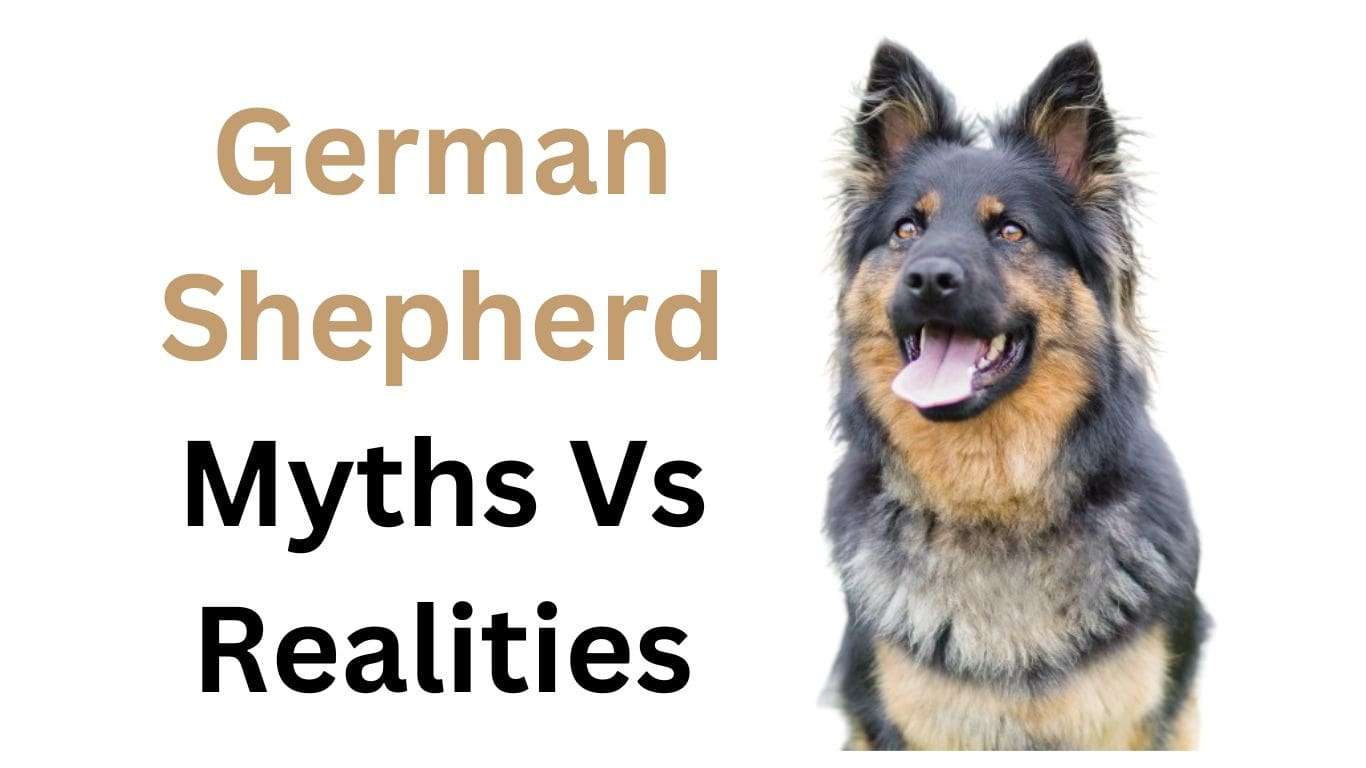German Shepherd: Myths Vs Realities
German Shepherd
Myths vs Realities
German Shepherds are one of the world’s most popular and admired dog breeds, noted for their intelligence, loyalty, and adaptability.
They have, however, become the subject of several myths and misconceptions, as have many popular breeds.
We’ll refute some of the most frequent German Shepherd myths in this blog post and set the record straight.

Myth 1: Aggressive Nature
Myth 1: German Shepherds Are Aggressive by Nature
Reality: This is one of the most common fallacies regarding German Shepherds.
While they are recognized for their protective instincts, it is critical to distinguish between protective and aggressive behavior.
German Shepherds are not naturally aggressive.
They are often protective of their families and can be educated to be pleasant and well-behaved.
German Shepherd aggression is generally the result of inadequate socialisation, cruelty, or neglect.
Myth 2: Aren't Good with Children
Myth 2: German Shepherds Aren’t Good with Children
Reality: German Shepherds are frequently portrayed as frightening dogs, giving the impression that they are not suitable for youngsters.
German Shepherds may make wonderful family dogs.
They are well-known for their fidelity and are frequently particularly protective of offspring.
However, early socialisation and training are required to ensure that they interact securely with children.
Myth 3: High Maintenance
Myth 3: German Shepherds Are High-Maintenance in Terms of Grooming
Reality: Because of their double coat, some people believe that German Shepherds require a lot of upkeep.
While they do shed, German Shepherds are not very high-maintenance. Brushing on a regular basis can help manage shedding, and baths are only required when they become unclean.
In comparison to other breeds, their coats are quite easy to maintain.
Myth 4: Prone to Hip Dysplasia
Myth 4: German Shepherds Are Prone to Hip Dysplasia
Reality: Although German Shepherds are predisposed to hip dysplasia, this does not guarantee that every individual will get the ailment.
Responsible breeding practices can minimize the risk of hip dysplasia greatly.
Choose a reliable breeder who tests their breeding dogs for this issue when purchasing a German Shepherd puppy.
Maintaining a healthy weight and eating the right foods can also help prevent hip dysplasia.
Myth 5: Not an Apartment Dog
Myth 5: German Shepherds Are Not Good Apartment Dogs
Reality: Some people assume that German Shepherds demand a large yard and are therefore unsuitable for apartment living.
While German Shepherds require space to move and play, they can adjust to apartment living if their exercise and mental stimulation requirements are met.
Daily walks, playing, and mental challenges might help them stay happy and healthy in cramped quarters.
Myth 6: Hard to Train
Myth 6: German Shepherds Are Difficult to Train
Reality: German Shepherds are frequently thought to be extremely trainable, although some people mistake their intelligence for stubbornness or difficulty in training.
German Shepherds are extremely trainable since they are intelligent.
They thrive on mental stimulation and respond well to training approaches that include positive reinforcement.
Training success requires consistency and perseverance.
Myth 7: Not a Family Dog
Myth 7: German Shepherds Make Good Guard Dogs, But Not Family Pets
Reality: It is often held that German Shepherds are best suited for security dog roles rather than as family pets.
While German Shepherds excel at protection, they are also affectionate and loyal family dogs.
They have the ability to be both protective and kind to their family, making them well-rounded companions.
Myth 8: Not an Emotional Support Animal
Myth 8: German Shepherd is not a good Emotional Support Animal (ESA)
Reality: The misconception that German Shepherds are unsuitable as Emotional Support Animals (ESAs) is completely untrue.
German Shepherds have a unique set of characteristics that make them excellent candidates for this task.
Their unwavering loyalty, close link with their owners, and exceptional sensitivity allow them to provide critical emotional support.
Myth 9: Not Good with Other Pets
Myth 9: German Shepherds Are Not Good with Other Pets
Reality: Proper socialization, beginning in puppyhood, is emphasized as the key to ensuring peaceful coexistence between German Shepherds and other animals such as dogs and cats.
To help them develop the required social skills, it is critical to expose them to other pets in a controlled, positive manner.
Strong leadership and persistent training are also emphasized for German Shepherds.
By establishing yourself as the pack leader and teaching crucial instructions such as “leave it” and “stay,” you can effectively manage their interactions with other pets.
Myth 10: Prone to Attack
Myth 10: German Shepherds Are Prone to Attacks
Reality: This expert investigation debunks the idea that German Shepherds are prone to attacks.
This myth is debunked because of a misunderstanding of the breed’s protective tendencies.
German Shepherds are not innately aggressive; rather, they are noted for their protective instincts, which makes them excellent guard dogs and protectors.
Final Thoughts
In conclusion, German Shepherds are wonderful canines who are frequently misunderstood.
Understanding the realities and eliminating these beliefs allows us to appreciate their genuine character and the good impact they may have in our lives as loving, loyal, and clever companions.
Proper training, socialization, and responsible ownership are essential for developing the greatest features of this extraordinary breed.
Paws for Thought: Further Reading and References
- Demography and disorders of German Shepherd Dogs under primary veterinary care in the UK
- Different conformations of the German shepherd dog breed affect its posture and movement
- German Shepherd dog
- New research reveals secrets of the demographics and disorders in German Shepherd Dogs
- Research Paper On German Shepherd
- Research Articles On German Shepherd
- Inertial Properties of the German Shepherd Dog

